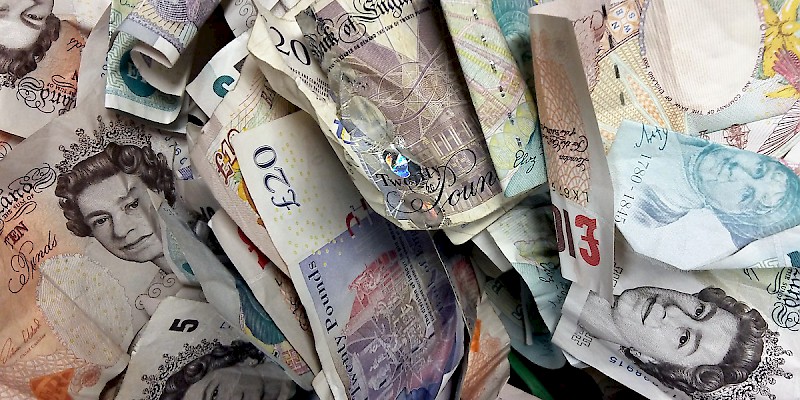Currency

The British unit of currency is the pound sterling (£).
The United Kingdom is one of several European countries that opted out of adopting the euro (and, in 2016, infamously voted to "Brexit" or leave the E.U. entirely).
The British unit of currency remains the pound sterling (£).
Roughly speaking, US$1 equals 70p; or £1 equals US$1.45.
You can learn the current daily exchange rate with the curency converter links listed to the right or below, or look in the business section of any major newspaper.
Pounds and pence
Bills come in denominations of £5, £10, £20, and £50.
A pound is divided into 100 pence, often called "pee" (p).
British coins include 1p, 2p, 5p, 10p, 20p, 50p, and everybody's favorite: the thick, weighty, golden £1 coin.
(Note, in September, 2016 they introduced a new, polymer £5 note. Though they kept the old blue-green color scheme, the design has changed—and the feel—and they replaced Elizabeth Fry on the back with a dour-looking Winston Churchill. The old fivers will still be valid until May 2017.)
We're going to need a bigger wallet
British pound notes—especially the £20—are notably larger than most other bills and bank notes in Europe and North America.
They are actually a bit wider than your typical (non-British) slim wallet, which can cause a bit of a problem, as the edge will just barely peek out, apt to get torn and frayed.
Mot folks simply fold £20 notes into thirds instead, and file them into their wallets sideways. This makes the wallet thicken quickly, but is the best solution.
- Ally.com - Online-only bank (and the one I use), with ATM feee refunds and no foreign transaction fees. Sadly, no credit cards (yet)—though you can use your MasterCard-branded bank card as a debit card.
- Usaa.com - Online-only bank open to current and former U.S. military personnel and their families; ATM fee refunds, and credit cards with only 1% foreign transaction fees.
- Schwab.com - This famous brokerage firm also offers online-only checking and savings accounts with ATM fee refunds.
- Asmarterchoice.org - Credit union–finding site. Credit unions often have low or no foreign trasnaction fees on their credit cards, ATM fee–refund policies, very few fees, and interest-bearing checking accounts. In other words: What a bank should be.
- Findabetterbank.com - Site to find credit unions and other local banks. These often have low or no foreign transaction fees on their credit cards and ATM fee–refund policies.
- Ncua.gov - All about credit unions.
- Credituniondb.com - Bare-bones credit union-finding database.
- Globalblue.com - Tax-free shopping
- Premiertaxfree.com - Tax-free shopping
- Taxfreeworldwide.com - Tax-free shopping
- Dfnionline.com - More than you ever wanted to about the world of duty-free—though this is a totally pro-Duty Free site, so take everything with a grain of salt.
- Moodiedavittreport.com - Another site devoted to the world of duty-free— and, again, very pro-Duty Free, so take everything with a grain of salt.
- Xoom.com - This newer entrant the the money-transfer game is all online and is now owned by PayPal. You can send up to $2,999 at a time for instant pickup at tens of thousands of locations around the globe for just $5 (though note that cash pickup is available only in some countries; for others, you may only wire funds into an existing bank account). Limit: $2,999.00.
- Westernunion.com - The old standby of Western Union offers one benefit over MoneyGram (below): in addition to online or in person from a Western Union office, the sender can do it over the phone (800-CALL-CASH, which is 800-225-5227), allowing your newest favorite uncle to bail you out from the comfort of his own home and send the quick cash to offices in any of 190 countries. For immediate transfers, you must pay with a credit card or debit card ($12–$145 fee), or you can draw from a bank account ($5, but takes 3 days). Limit: $2,999.00 (though you can sign up for a service that lifts that ceiling—but transfers will not be instantaneous).
- Moneygram.com - Money zips over the wires to offices in 155 countries worldwide in about ten minutes, for the privilege of which the sender, standing at his local MoneyGram branch office, gets to pay a fee of $12–$145 (depending on the amount sent), or just $5 if they draw directly from a bank account and you can wait 3 days. Plus the sender gets to include for free a 10-word message that arrives along with the funds, perhaps something along the lines of "When you get home I'm gonna tear you a new..." Limit: $2,999.00.






